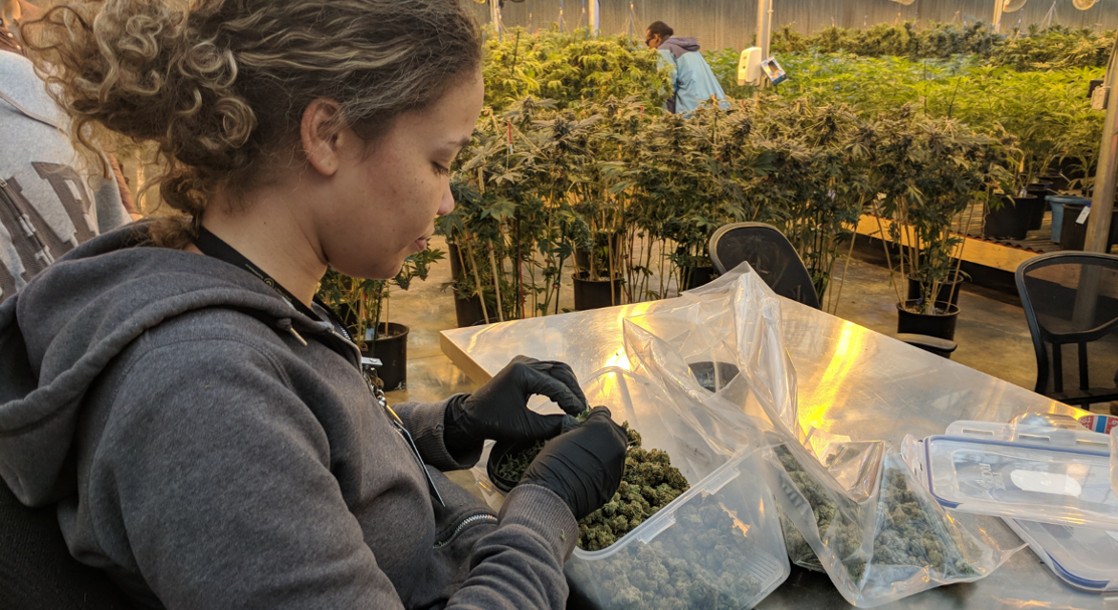Photo via My 420 Tours
Oregon's recreational cannabis industry has proved to be too much of a good thing for local pot farmers, who have grown a supply of legal weed that vastly exceeds the state's demand. The Oregon Liquor Control Commission (OLCC), which tracks every cannabis plant grown in the state from seed to sale, has reported that the amount of marijuana that local farmers have produced so far this year is already triple the amount consumed last year. That problem is soon to get worse, as cultivators harvest their next crop of weed next month, which could double the existing inventory.
Oregon has been struggling with its weed overproduction problem in recent years, and despite threats of a federal crackdown, has yet to get the matter under control. As supply has exploded past demand, the prices of weed have been tanking, and many cultivators have been selling off their excess product to smugglers, who can sell it for more money in prohibition states. This burgeoning black market has drawn the attention of the federal government, and U.S. Attorney Billy Williams has repeatedly threatened intervention from federal law enforcement if the state can't solve the matter on their own.
This May, the OLCC temporarily stopped accepting applications from new cannabis businesses, and last month, imposed a serious cap on the daily amount of weed that medical marijuana patients are allowed to buy, in order to stop suspected diversion to illegal vendors. These tactics are only a drop in the bucket, however, and overproduction issues are still plaguing the industry. "This time last year, I was getting $1,800 to $2,200 per pound for my flower," James Schwartz, owner of the Cascade High farm, said to Williamette Week. "Right now, I can get $500 to $800 per pound on average. Last year, I had 15 employees, and now I can only afford four. Most of us are on the verge of going out of business…"
But Adam Smith, director of the state's Craft Cannabis Alliance (CCA), has proposed a bold solution to the problem: allowing local cultivators to export excess marijuana to other canna-legal states. "We legalized cannabis, but the only people making a living in the cannabis industry are the ones who decided not to get licenses," said Smith to Williamette Week. "A licensed transfer into another legal state isn't radical. There is no faster way to incentivize growers to transition from the black market to the legal, regulated market than legalizing export."
Smith's organization is eyeing the East Coast as a possible destination for their extra weed. Massachusetts is just now getting its adult-use market together, and legalization is looking increasingly likely in both New York and New Jersey. "When it comes to sungrown, soil-grown flower, they simply can't grow the way we do on the East Coast," Christopher Dolinar of Oregon cultivator Pilot Farms told Williamette Week. "Definitely not at these price points." Dolinar added that if one of these states were to use the same seed-to-sale tracking system as Oregon, the process could be even smoother.
The CCA has joined a lobbying effort called One Fix Cannabis, which hopes to see legal interstate cannabis transportation become a reality within the next five years. "Exports don't solve everything," Smith said. "But no conversation about cannabis — whether it's talking economic potential or legal weed being diverted to the illegal market — is complete without acknowledging the logical move toward legalizing cannabis exports… All we need to get the ball rolling is a bill that gives permission for the OLCC to allow legal exports between Oregon and other legal states.”
Smith's proposal has a serious problem, however — transferring pot across state lines is a violation of federal code, and Attorney General Jeff Sessions is particularly eager to enforce cannabis prohibition laws to the letter. Pro-cannabis lawmakers have proposed a number of bills that could solve this problem by removing marijuana from the federal Controlled Substances Act, but unfortunately, these bills seem unlikely to succeed this year. Legislative support for cannabis reform has been growing by leaps and bounds every session though, so there’s still a chance that the CCA may be able to achieve its five-year goal.











